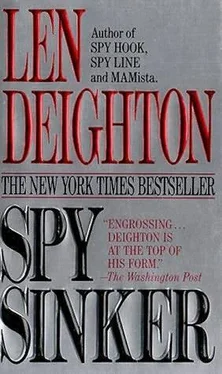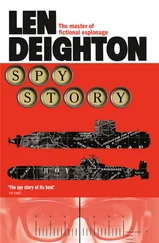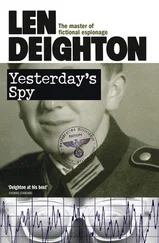Len Deighton - Spy Sinker
Здесь есть возможность читать онлайн «Len Deighton - Spy Sinker» — ознакомительный отрывок электронной книги совершенно бесплатно, а после прочтения отрывка купить полную версию. В некоторых случаях можно слушать аудио, скачать через торрент в формате fb2 и присутствует краткое содержание. Жанр: Триллер, на английском языке. Описание произведения, (предисловие) а так же отзывы посетителей доступны на портале библиотеки ЛибКат.
- Название:Spy Sinker
- Автор:
- Жанр:
- Год:неизвестен
- ISBN:нет данных
- Рейтинг книги:4 / 5. Голосов: 1
-
Избранное:Добавить в избранное
- Отзывы:
-
Ваша оценка:
- 80
- 1
- 2
- 3
- 4
- 5
Spy Sinker: краткое содержание, описание и аннотация
Предлагаем к чтению аннотацию, описание, краткое содержание или предисловие (зависит от того, что написал сам автор книги «Spy Sinker»). Если вы не нашли необходимую информацию о книге — напишите в комментариях, мы постараемся отыскать её.
Spy Sinker — читать онлайн ознакомительный отрывок
Ниже представлен текст книги, разбитый по страницам. Система сохранения места последней прочитанной страницы, позволяет с удобством читать онлайн бесплатно книгу «Spy Sinker», без необходимости каждый раз заново искать на чём Вы остановились. Поставьте закладку, и сможете в любой момент перейти на страницу, на которой закончили чтение.
Интервал:
Закладка:
'No,' she said.
He turned far enough to get from the shelf a large glass jar inside which a brain was to be seen in murky formalin, 'Look at that,' he said, putting it on the desk. 'That's the brain of "Der Grosse Gustaf", who was a music hall performer of the nineteen thirties. Anyone in the audience could ask him such questions as who fought Max Schmeling in 1933. He'd immediately tell them it was Max Baer who won on a technical knockout in the tenth round in New York City.'
'That's impressive,' said Fiona.
'I'm interested in boxing,' explained Wieczorek. He tapped the jar. 'But "The Great Gustaf" could answer any sort of question: he had a brain like an encyclopedia.'
'Why is it here?'
'There remains in the Soviet Union a small but influential group of medical men who think that slicing up the human brain will reveal some of nature's secrets. Lenin's brain was sliced up and studied under the microscope. So was Stalin's. So were a lot of lesser brains before and since.'
'What did they find?'
'That seems to be a State secret.'
'They discovered nothing, you mean?'
'I didn't say that, did I?' He tapped the jar again. 'But I saved Gustaf from such indignity. Gustaf has his brain intact.'
'Where did you get such a thing?'
'It came from the Charité Hospital at the end of the war. All hospitals have a roomful of such stuff. When the Red Army infantry got into the Charité during the fighting in 1945 they found the generals, and other high-ups who'd been hanged for trying to assassinate Hitler. Their bodies were still preserved in the post-mortem room refrigerators there. The cadavers had been sent from the Plötzensee prison and no one had been told what to do with them. And there was the medical museum, with all sorts of other stuff, over there too but the Red Army high command disapproved and the exhibits were sent to other institutions. We got Gustaf's brain.' He shook the jar so that the brain moved. 'The distribution of the exhibits started a lot of silly rumours. They said that-Ernst Rohm's heart had been sent to the University Hospital in Leipzig and it had been contained in a test tube.' He put the jar back on the shelf. 'You must forgive me: physicians are inclined to develop a macabre sense of humour.'
'What sort of success rate do you have. Doctor?'
'They are all failures when they come here,' said Wieczorek. 'We only get patients for whom some other institution can do no more. For most of them we can merely keep the fires under control. It is like the job of your security service, isn't it? Are we drawn to such work, do you think?'
'Surely you are better equipped to answer that question,' said Fiona.
'I cannot answer on your behalf, but for me and many of my colleagues I suspect that dealing in failure provides an excuse for a lack of success. And like you perhaps, I enjoy the challenge of such fragile, complicated and deceptive disciplines. Can you ever be sure that you are right?' He paused. 'Right about anything at all?'
'Sometimes,' said Fiona. 'You still haven't told me about your methods.'
'Carl Jung once said, "Show me a sane man and I will cure him for you." I think about that a lot. Methods? What can I tell you?' He looked at her with polite interest. The treatment of seriously disturbed patients has changed radically over the years. First and foremost there remains the old-fashioned analytical session in which patients are encouraged to delve into their own minds. As Freud discovered, it is a lengthy process. So along came the neuro-surgeons who drilled holes into the skull and destroyed brain cells and nerve fibres with surgical instruments.' He waited while the horror of that became clear to her. 'Then came a time when it seemed as if electric shocks through the brain could provide lasting improvement, and that seemed to be the panacea everyone had awaited. It wasn't the answer we had hoped for. But the chemists were waiting their turn, and patients were given massive doses of Dexedrine followed by Seconal and whatever new drug the West German chemical companies were anxious to sell. Now I suppose many specialists are beginning to think that amid his claptrap, Freud may have had a few worthwhile ideas after all. But analysis on the couch is a very long process: we'll never have enough analysts to fight mental illness in that laborious way.'
'And where do you stand?'
'In the matter of treatment? I am a senior consultant here but my staff are permitted considerable freedom to choose what is best for their patients. We have mostly depressives and schizophrenics, some of them catatonics demanding a lot of skill and close attention. However it is in the nature of our function, as a garbage can into which patients are discarded, that we treat a wide variety of illness. After many years of practice I have become reluctant to forbid any kind of treatment that a doctor, after a proper study of a patient, thinks will be beneficial.'
'You forbid nothing?'
'That is my stated position.'
'Including lobotomy?'
'A seriously disturbed patient who becomes violent can sometimes be returned to something approaching normal Life.' He got up. 'Let me show you the wards.'
The clinic was hushed but not entirely silent. Most of the patients were in bed, sleeping with that impassive calm that medicine provides. One small ward was in semi-darkness. It held six sleepers who had been sedated for a week. It was, explained Doktor Wieczorek, the preliminary part of the treatment for most new arrivals. Underlying the smell of disinfectant there were all the disagreeable odours that warm bodies provide when crowded together in a closed room. He went to the window and raised the blind a fraction so that they could see the sleeping patients. Outside, she saw that the snow was falling much more heavily, the trees were rimed with it and passing cars left black Lines in the road. Doktor Wieczorek adjusted the disarranged bedclothes. Sometimes, he joked, it took a week or two for their documentation to catch up with them.
The rooms were all lined with white tiles from floor to ceiling. There was something pitiless about the shiny hardness as it reflected the grey blankets. An ashen-faced patient stared at her but didn't register any emotion. Fiona had that guilty feeling of intrusion that afflicts all fit people in the presence of the sick. Wieczorek pulled down the blind and it was dark. As if in response to the darkness, one of the patients gave a muffled cry but then went quiet again.
Downstairs there was a large 'association room' where half a dozen patients were sitting in metal chairs with blankets over their knees. Two of them, both middle-aged men, were wearing woolly hats. There was no sign of books or newspapers and the patients were either asleep or staring into space. A TV set in the corner was showing a cartoon film, in which a hatchet-wielding mouse was chasing a cat, but the sound was switched off and no one was watching it.
'There is one patient you must meet,' said Doktor Wieczorek. 'Franz: he is our oldest inhabitant. When we got him, in 1978, his memory had completely gone but we are proud to have made a little progress.' He showed her into a bare room with a big square-shaped sink equipped for washing bed-pans. There was a man sitting there in a wheelchair. His body had run to fat as a consequence of his confinement. His complexion was yellowish and his lips were pressed tightly together as if he was trying not to yell. 'Come along, Franz. What about a cup of coffee?'
The man in the wheelchair said nothing, and made no move, except that he rolled his eyes as if trying to see the doctor's face without moving his head. 'I've brought a lady to see you, Franz. It's a long time since you had a visitor, isn't it?' To Fiona Doktor Wieczorek said, 'With patients of this sort the condition varies greatly from day to day.'
Читать дальшеИнтервал:
Закладка:
Похожие книги на «Spy Sinker»
Представляем Вашему вниманию похожие книги на «Spy Sinker» списком для выбора. Мы отобрали схожую по названию и смыслу литературу в надежде предоставить читателям больше вариантов отыскать новые, интересные, ещё непрочитанные произведения.
Обсуждение, отзывы о книге «Spy Sinker» и просто собственные мнения читателей. Оставьте ваши комментарии, напишите, что Вы думаете о произведении, его смысле или главных героях. Укажите что конкретно понравилось, а что нет, и почему Вы так считаете.












